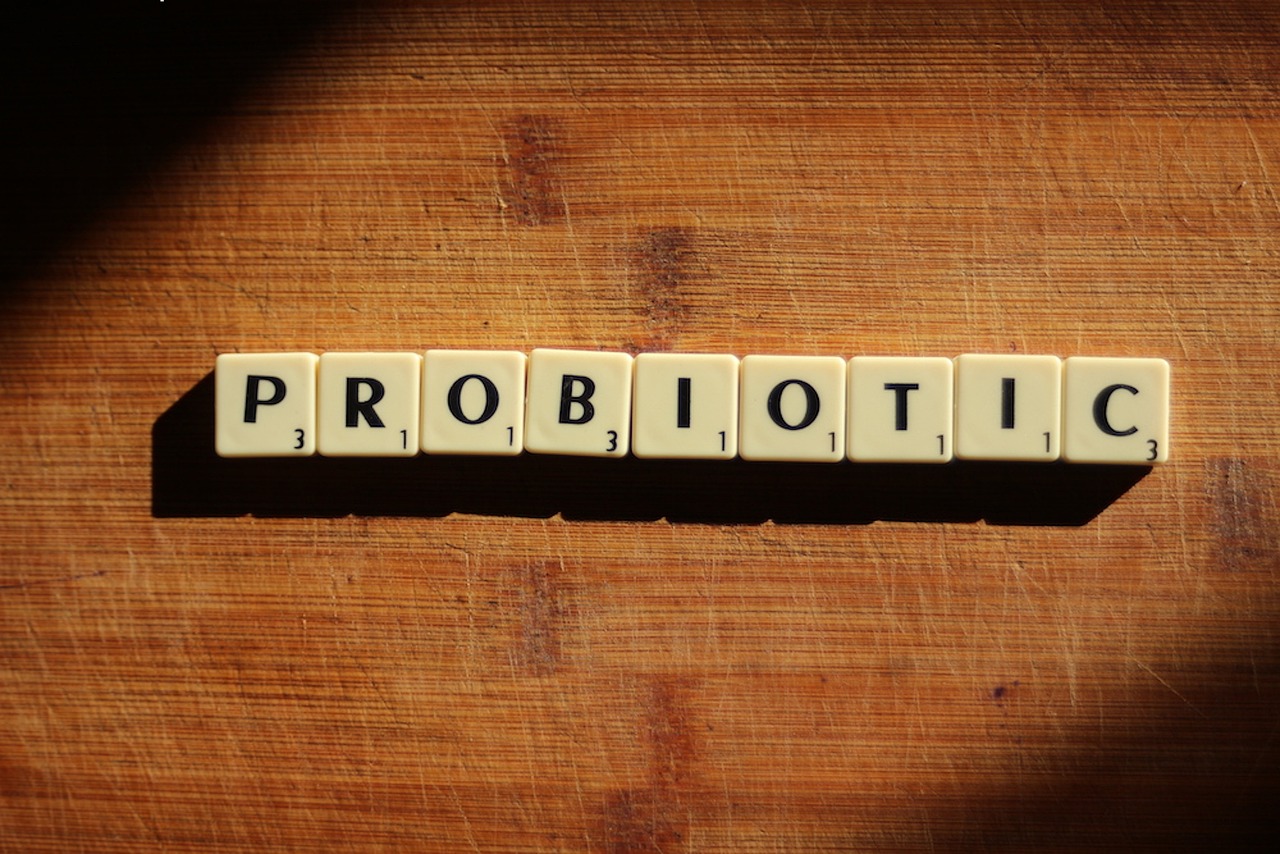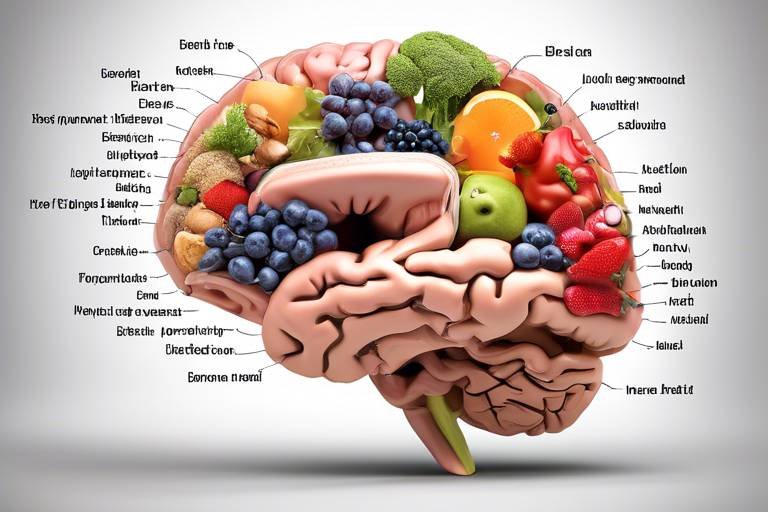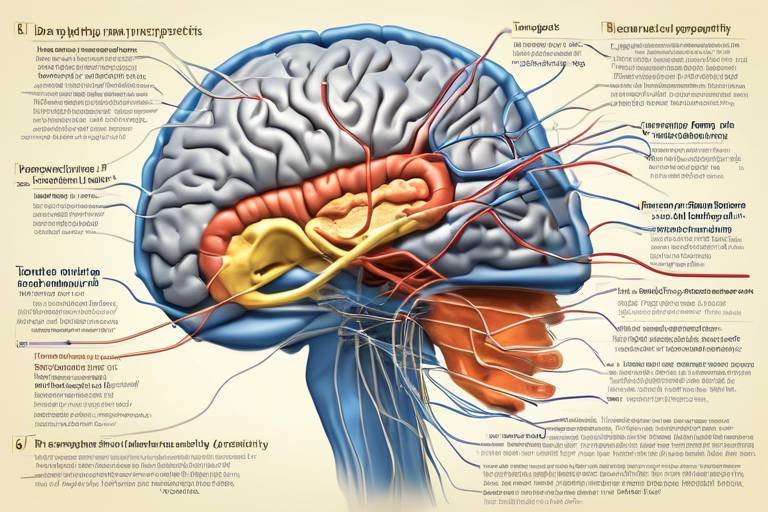The Biology of Nutrition and Brain Health
The intricate relationship between nutrition and brain function is a fascinating area of study that has gained significant attention in recent years. Our brains are not only the control centers of our bodies but also the epicenters of our thoughts, emotions, and memories. Just like a high-performance car needs the right fuel to run smoothly, our brains require specific nutrients to operate at their best. The food we consume can either enhance or impair cognitive health, influencing everything from our mood to our memory. So, what exactly does this mean for you? It means that by understanding the biology of nutrition, you can make informed dietary choices that support your brain health.
Imagine your brain as a complex machine with numerous moving parts, all working together to keep you functioning optimally. Each nutrient plays a unique role in this grand design. For instance, carbohydrates provide the energy necessary for brain activity, while proteins supply the building blocks for neurotransmitters—chemicals that transmit signals in the brain. Fats, particularly those that are healthy and unsaturated, are crucial for maintaining the structure of brain cells. In essence, the right mix of macronutrients and micronutrients can significantly enhance cognitive function and mental well-being.
Moreover, the impact of nutrition on brain health extends beyond just immediate effects. Long-term dietary patterns can shape brain development and influence the risk of cognitive decline as we age. As we delve deeper into this article, we will explore how specific nutrients, like omega-3 fatty acids and antioxidants, contribute to brain health, as well as the emerging science behind the gut-brain connection. So, buckle up! We’re about to embark on a journey into the world of nutrition and brain health that could change how you think about your diet.
Macronutrients are the essential nutrients that our bodies require in large amounts, and they include carbohydrates, proteins, and fats. Each of these macronutrients plays a pivotal role in maintaining brain health. Carbohydrates are the brain's primary source of energy, fueling cognitive processes and supporting overall brain function. When you consume carbohydrates, they are broken down into glucose, which is then used by the brain to perform its myriad tasks.
Proteins, on the other hand, are vital for the synthesis of neurotransmitters, which are crucial for communication between brain cells. These neurotransmitters, such as serotonin and dopamine, influence our mood and emotional well-being. A diet rich in protein sources, such as lean meats, legumes, and nuts, can help ensure that your brain has the necessary materials to produce these important chemicals.
Finally, healthy fats, particularly omega-3 fatty acids, are essential for maintaining the structural integrity of brain cells. They also play a role in reducing inflammation and promoting neurogenesis—the process by which new neurons are formed in the brain. Incorporating sources of healthy fats into your diet, such as avocados, olive oil, and fatty fish, can significantly benefit your brain health.
While macronutrients provide the energy and building blocks our brains need, micronutrients—which include vitamins and minerals—play equally crucial roles in supporting cognitive function and mental health. Deficiencies in certain vitamins and minerals can lead to cognitive decline, mood disorders, and other mental health issues. For instance, vitamin B12 is essential for maintaining healthy nerve cells and producing DNA and RNA. A deficiency in this vitamin can lead to memory loss and cognitive impairment.
Similarly, minerals like magnesium and zinc are vital for various brain functions, including neurotransmission and neuroplasticity—the brain's ability to adapt and change. A well-balanced diet rich in fruits, vegetables, whole grains, and lean proteins can help ensure that you receive the necessary micronutrients to support your brain health.
Among the various nutrients that impact brain health, omega-3 fatty acids stand out as particularly vital. These essential fats are crucial for maintaining the structure and function of brain cells. Research has shown that omega-3 fatty acids can help reduce inflammation in the brain, which is linked to various neurodegenerative diseases. Additionally, they support neurogenesis, promoting the growth of new neurons and enhancing overall brain function.
Identifying dietary sources of omega-3 fatty acids is essential for maintaining optimal brain health. Some of the best sources include:
- Fatty fish, such as salmon, mackerel, and sardines
- Chia seeds and flaxseeds
- Walnuts
- Algal oil (a plant-based source)
Research shows a strong link between omega-3 intake and mental health outcomes. Studies have indicated that individuals with higher omega-3 levels tend to experience lower rates of depression and anxiety. By incorporating omega-3-rich foods into your diet, you can potentially improve your mood and overall mental well-being.
Antioxidants are another group of nutrients that play a crucial role in protecting the brain from oxidative stress. Oxidative stress occurs when there is an imbalance between free radicals and antioxidants in the body, leading to cellular damage. This damage is a contributing factor to neurodegenerative diseases such as Alzheimer’s and Parkinson’s. Consuming a diet rich in antioxidants can help combat this oxidative damage, supporting brain health and potentially reducing the risk of cognitive decline.
Emerging research highlights the gut-brain axis, revealing how gut health influences brain function. The gut microbiota, the community of microorganisms living in our digestive tract, plays a significant role in our overall health, including our mental health. A healthy gut microbiome can produce neurotransmitters and other compounds that positively affect brain function. Conversely, an imbalanced gut microbiota can lead to inflammation and negatively impact cognitive health.
Probiotics, which are beneficial bacteria, can enhance gut health and may have positive effects on brain function. Some studies suggest that incorporating probiotics into your diet could lead to improvements in mood, memory, and overall cognitive function. Foods rich in probiotics include yogurt, kefir, sauerkraut, and other fermented products.
Certain dietary patterns, such as the Mediterranean diet, have been linked to better cognitive health. This diet emphasizes whole foods, including fruits, vegetables, whole grains, fish, and healthy fats, while limiting processed foods and sugars. Research has shown that those who adhere to this dietary pattern tend to have a lower risk of cognitive decline and neurodegenerative diseases. By adopting a Mediterranean-style diet, you can nourish both your body and your brain.
1. How does nutrition affect brain health?
Nutrition provides the essential nutrients needed for optimal brain function, influencing everything from cognitive performance to mood regulation. A balanced diet rich in macronutrients and micronutrients supports brain structure and function.
2. What are the best foods for brain health?
Foods rich in omega-3 fatty acids, antioxidants, vitamins, and minerals are excellent for brain health. Examples include fatty fish, berries, nuts, leafy greens, and whole grains.
3. Can dietary changes improve mental health?
Yes, certain dietary changes can positively impact mental health. Incorporating omega-3 fatty acids, probiotics, and antioxidants into your diet may help reduce symptoms of depression and anxiety.
4. Is the Mediterranean diet good for brain health?
Absolutely! The Mediterranean diet, rich in whole foods and healthy fats, has been associated with better cognitive health and a lower risk of neurodegenerative diseases.

The Role of Macronutrients
When we talk about brain health, we can't ignore the role of macronutrients. These are the nutrients that our bodies require in large amounts to function properly, and they include carbohydrates, proteins, and fats. Each of these macronutrients plays a unique and crucial role in maintaining optimal cognitive function and energy levels in the brain. Think of your brain as a high-performance engine; just like a car needs the right fuel to run smoothly, your brain needs the right macronutrients to function at its best.
Let's break it down a bit. Firstly, carbohydrates are the primary source of energy for the brain. They are broken down into glucose, which is the brain's preferred fuel. Without enough carbohydrates, your brain may feel sluggish, leading to difficulties in concentration and memory. Imagine trying to drive a car on empty; it just won’t perform well. Therefore, ensuring a steady intake of complex carbohydrates, such as those found in whole grains, fruits, and vegetables, is vital for keeping your brain energized throughout the day.
Next up, we have proteins. These are the building blocks of neurotransmitters, the chemicals that transmit signals in the brain. A diet rich in quality proteins can enhance cognitive functions like memory and learning. Foods such as lean meats, fish, beans, and nuts are excellent sources of protein that also come packed with other nutrients beneficial for brain health. Think of proteins as the construction workers that build and maintain the infrastructure of your brain.
Finally, we can't overlook fats, particularly the healthy types like monounsaturated and polyunsaturated fats. These fats are essential for the formation of brain cell membranes and play a critical role in maintaining the brain's structure. Omega-3 fatty acids, found in fatty fish and flaxseeds, are particularly important as they contribute to improved cognitive function and have been linked to a reduced risk of neurodegenerative diseases. In a way, healthy fats are like the oil that keeps the machinery running smoothly, preventing wear and tear on the brain.
So, how do we ensure we're getting the right balance of these macronutrients? A well-rounded diet that incorporates a variety of foods is key. Here’s a quick overview of how to balance these nutrients:
| Macronutrient | Function in Brain Health | Food Sources |
|---|---|---|
| Carbohydrates | Primary energy source | Whole grains, fruits, vegetables |
| Proteins | Build neurotransmitters | Lean meats, fish, beans, nuts |
| Fats | Maintain brain structure | Fatty fish, flaxseeds, avocados |
In summary, the macronutrients you consume play a pivotal role in supporting your brain's health and functionality. By understanding their unique contributions and ensuring a balanced intake, you can fuel your brain for better performance, improved mood, and enhanced cognitive abilities. Remember, just like a well-oiled machine, your brain needs the right nutrients to function effectively!

The Impact of Micronutrients
When we think about nutrition, we often focus on macronutrients like carbohydrates, proteins, and fats. However, we can't overlook the importance of micronutrients—the vitamins and minerals that play a crucial role in maintaining our brain health. These tiny but mighty nutrients are essential for various brain functions, including memory, mood regulation, and overall cognitive performance. Have you ever wondered why some days you feel sharper than others? The answer might lie in your micronutrient intake.
Micronutrients are vital for the synthesis of neurotransmitters, which are the chemical messengers that facilitate communication between brain cells. For example, vitamin B6 is necessary for the production of serotonin, a neurotransmitter that stabilizes mood and feelings of well-being. Similarly, vitamin B12 is important for maintaining healthy nerve cells and producing DNA, which is crucial for brain development. A deficiency in these vitamins can lead to cognitive decline and even mental health issues. It's like trying to drive a car without oil; it may run for a while, but eventually, it will sputter out.
Moreover, minerals such as zinc and iron are equally important. Zinc, for instance, is involved in synaptic function and signaling, while iron is critical for oxygen transport in the blood, which is essential for brain energy metabolism. A lack of these minerals can impair cognitive abilities and lead to fatigue and poor concentration. In fact, studies have shown that children with iron deficiency may experience delays in cognitive development, highlighting the significance of these micronutrients from a young age.
So, how can we ensure we're getting enough of these essential micronutrients? It starts with a balanced diet rich in fruits, vegetables, whole grains, and lean proteins. Here’s a quick look at some key micronutrients and their food sources:
| Micronutrient | Benefits | Food Sources |
|---|---|---|
| Vitamin B6 | Supports neurotransmitter synthesis | Poultry, fish, potatoes, chickpeas |
| Vitamin B12 | Maintains nerve cells, produces DNA | Meat, dairy products, fortified cereals |
| Zinc | Involved in synaptic function | Meat, shellfish, legumes, seeds |
| Iron | Essential for oxygen transport | Red meat, beans, lentils, spinach |
In conclusion, micronutrients are not just supplementary; they are foundational to our cognitive health. By ensuring we consume a variety of nutrient-rich foods, we can support our brain's needs and enhance our mental well-being. Remember, your brain is like a garden—if you nourish it with the right nutrients, it will flourish and grow. So, the next time you sit down for a meal, think about how you can add a splash of color from fruits and vegetables to your plate—your brain will thank you!
- What are micronutrients? Micronutrients are vitamins and minerals that are essential for various bodily functions, including brain health.
- How do micronutrients affect brain function? They play critical roles in neurotransmitter synthesis, cognitive performance, and mood regulation.
- What foods are high in micronutrients? Fruits, vegetables, whole grains, lean proteins, nuts, and seeds are excellent sources of micronutrients.

When we talk about brain health, one nutrient that often comes up is omega-3 fatty acids. These essential fats are not just buzzwords in the health community; they play a pivotal role in maintaining and enhancing cognitive function. Think of omega-3s as the building blocks of your brain. They are crucial for the structural integrity of brain cells and are involved in various brain functions, including memory, learning, and even mood regulation.
But what exactly makes omega-3 fatty acids so special? To start, they are known for their anti-inflammatory properties. Inflammation in the brain can lead to a myriad of issues, including neurodegenerative diseases like Alzheimer's. Omega-3s help combat this inflammation, creating a healthier environment for your neurons to thrive. Additionally, they support neurogenesis, the process of generating new neurons, which is vital for cognitive flexibility and overall brain health.
Research has shown that higher levels of omega-3 fatty acids in the diet are associated with improved cognitive performance. For instance, studies indicate that individuals who consume adequate amounts of omega-3s tend to score higher on tests measuring memory and executive function. It's fascinating to think that something as simple as dietary choices can have profound effects on our cognitive abilities!
Now, you might be wondering, “How can I ensure I’m getting enough omega-3s in my diet?” Here’s where it gets exciting! There are plenty of delicious sources of omega-3 fatty acids, both from animal and plant origins. Some of the richest sources include:
- Fatty fish such as salmon, mackerel, and sardines
- Chia seeds and flaxseeds - great plant-based options
- Walnuts - a tasty snack that’s good for your brain
- Algal oil - a vegan source derived from algae
Incorporating these foods into your meals can be both simple and enjoyable. For example, adding a handful of walnuts to your morning oatmeal or enjoying a salmon fillet for dinner can be great ways to boost your omega-3 intake.
In conclusion, omega-3 fatty acids are not just another health trend; they are essential for maintaining optimal brain function. Their ability to reduce inflammation and support neurogenesis makes them invaluable in the quest for better cognitive health. So, the next time you think about your diet, remember that what you eat can significantly impact your brain's health and performance.
1. What are omega-3 fatty acids?
Omega-3 fatty acids are essential fats that the body cannot produce on its own. They are crucial for brain function and overall health.
2. How can I increase my omega-3 intake?
You can increase your omega-3 intake by consuming fatty fish, flaxseeds, chia seeds, walnuts, and algal oil. Try incorporating these into your meals regularly!
3. Are there any side effects of taking omega-3 supplements?
While omega-3 supplements are generally safe, they can cause mild side effects like fishy aftertaste or gastrointestinal discomfort in some individuals. It's always best to consult with a healthcare provider before starting any new supplement.

Sources of Omega-3
When it comes to brain health, omega-3 fatty acids are like the superheroes of nutrition. These essential fats play a crucial role in maintaining brain structure and function, but the real question is: where can we find them? Luckily, the answer is a lot more delicious than you might think! Omega-3s can be found in a variety of foods, both from animal and plant sources, allowing you to easily incorporate them into your diet.
First, let’s dive into the oceanic treasures. Fatty fish such as salmon, mackerel, sardines, and trout are among the best sources of omega-3s. These fish are rich in two specific types of omega-3 fatty acids: EPA (eicosapentaenoic acid) and DHA (docosahexaenoic acid), both of which are vital for cognitive function and overall brain health. Consuming these fish just twice a week can significantly boost your omega-3 levels and contribute to better mental clarity.
But what if you’re not a fan of fish or follow a plant-based diet? No worries! There are plenty of plant-based sources of omega-3s that can fit seamlessly into your meals. For instance, flaxseeds, chia seeds, and walnuts are excellent options. These foods contain ALA (alpha-linolenic acid), another type of omega-3 that your body can convert to EPA and DHA, albeit at a lower efficiency. Incorporating a tablespoon of ground flaxseeds into your morning smoothie or sprinkling chia seeds on your yogurt can be a simple yet effective way to boost your omega-3 intake.
Here’s a quick snapshot of some great sources of omega-3 fatty acids:
| Source | Type of Omega-3 | Serving Size |
|---|---|---|
| Salmon | EPA, DHA | 3.5 ounces (100 grams) |
| Chia Seeds | ALA | 1 ounce (28 grams) |
| Walnuts | ALA | 1 ounce (28 grams) |
| Flaxseeds | ALA | 1 tablespoon (10 grams) |
| Sardines | EPA, DHA | 3.5 ounces (100 grams) |
In addition to these foods, omega-3 supplements such as fish oil or algal oil (a plant-based alternative) are also available. These can be an excellent option for those who find it challenging to get enough omega-3s through their diet alone. However, it’s always best to consult with a healthcare professional before starting any supplement regimen.
So, whether you’re enjoying a hearty salmon dinner or sprinkling some chia seeds on your breakfast, incorporating omega-3 fatty acids into your diet is not just beneficial but also a tasty way to support your brain health. Remember, a well-nourished brain is a happy brain!
- What are omega-3 fatty acids? Omega-3 fatty acids are essential fats that our bodies cannot produce on their own, making it necessary to obtain them from our diet.
- How much omega-3 should I consume daily? While recommendations vary, a general guideline is to aim for at least 250-500 mg of combined EPA and DHA per day for general health.
- Can I get enough omega-3s from a vegetarian diet? Yes! Plant-based sources like flaxseeds, chia seeds, and walnuts provide ALA, which can contribute to your omega-3 intake.
- Are omega-3 supplements effective? Omega-3 supplements can be effective, especially for those who do not consume enough omega-3-rich foods. However, it's advisable to consult a healthcare provider for personalized advice.

Omega-3 and Mental Health
When it comes to mental health, the role of omega-3 fatty acids cannot be overstated. Research has been increasingly pointing to the idea that these essential fats are not just important for physical health, but play a significant role in maintaining and improving our mental well-being. Imagine your brain as a finely tuned engine; without the right fuel, it just won't run smoothly. Omega-3s are like high-quality gasoline for that engine, helping it to function optimally.
Studies have shown that individuals with higher levels of omega-3 fatty acids in their diets tend to experience lower rates of depression and anxiety. This correlation is not just a coincidence; it’s backed by science. For instance, a meta-analysis published in the journal Psychological Medicine found that omega-3 supplementation significantly reduced symptoms of depression in various populations. What’s fascinating is that the brain itself is composed of nearly 60% fat, and a large portion of that is made up of omega-3s, particularly DHA (docosahexaenoic acid). This means that these fatty acids are crucial for maintaining brain structure and function.
But how exactly do omega-3s influence our mood? One of the key mechanisms is their ability to reduce inflammation in the brain. Chronic inflammation has been linked to various mental health disorders, including depression. By reducing this inflammation, omega-3s may help in alleviating symptoms. Moreover, omega-3s are believed to enhance the production of neurotransmitters like serotonin and dopamine—chemicals that play a vital role in mood regulation. Think of omega-3s as the friendly neighborhood superheroes that swoop in to save your brain from the villains of anxiety and depression.
Furthermore, a diet rich in omega-3s can also improve overall cognitive function, which can indirectly boost mental health. Better focus, improved memory, and enhanced problem-solving skills can lead to a more positive outlook on life, reducing feelings of hopelessness or anxiety. So, incorporating omega-3s into your diet not only supports your brain's physical structure but also fortifies your mental resilience.
Here’s a quick overview of how omega-3 fatty acids can impact mental health:
| Benefit | Description |
|---|---|
| Reduces Depression | Higher omega-3 intake is linked to lower rates of depression. |
| Alleviates Anxiety | Omega-3s may help reduce anxiety symptoms. |
| Enhances Cognitive Function | Improves focus, memory, and problem-solving skills. |
| Reduces Inflammation | Helps to lower chronic inflammation in the brain. |
In conclusion, if you’re looking to boost your mental health, consider adding more omega-3 fatty acids to your diet. Whether through fatty fish, flaxseeds, or supplements, these powerful nutrients can provide the support your brain needs to thrive. So, why not treat your brain to some omega-3 goodness? It might just be the lift you need to feel your best!
- What are omega-3 fatty acids? Omega-3 fatty acids are essential fats that our body cannot produce on its own. They are crucial for brain health and overall well-being.
- How can I incorporate omega-3s into my diet? You can include foods like salmon, walnuts, flaxseeds, and chia seeds in your meals to boost your omega-3 intake.
- Can omega-3s help with anxiety and depression? Yes, research suggests that omega-3 fatty acids may help reduce symptoms of anxiety and depression.
- Are there any side effects of omega-3 supplements? While omega-3 supplements are generally safe, they can cause mild side effects like digestive discomfort in some individuals. Always consult a healthcare provider before starting any new supplement.

Antioxidants and Brain Protection
When we talk about brain health, we can't overlook the role of antioxidants. These mighty compounds are like the superheroes of our body, swooping in to combat the evil forces of oxidative stress. You see, oxidative stress occurs when there's an imbalance between free radicals and antioxidants in the body, leading to cellular damage. This is particularly concerning for our brains, which are highly susceptible to oxidative damage due to their high oxygen consumption and lipid content.
Research has shown that antioxidants not only help in protecting brain cells but also play a crucial role in promoting overall cognitive function. They help to neutralize free radicals, which are unstable molecules that can cause significant harm if left unchecked. Think of antioxidants as your brain's bodyguards, shielding it from the wear and tear that can lead to neurodegenerative diseases such as Alzheimer's and Parkinson's. By incorporating antioxidant-rich foods into your diet, you can significantly enhance your brain's resilience.
Some of the most potent antioxidants include vitamins C and E, flavonoids, and polyphenols. These compounds are found in a variety of foods, such as:
- Berries: Blueberries, strawberries, and blackberries are packed with flavonoids.
- Nuts: Almonds and walnuts are great sources of vitamin E.
- Green Leafy Vegetables: Spinach and kale provide a wealth of antioxidants.
- Dark Chocolate: Yes, you read that right! Dark chocolate is rich in flavonoids.
- Tea: Green tea is especially known for its high levels of catechins.
Incorporating these foods into your daily meals can be both delicious and beneficial for your brain. Imagine starting your day with a smoothie packed with spinach, berries, and a sprinkle of dark chocolate—what a treat for your taste buds and your brain!
Moreover, several studies suggest that a diet rich in antioxidants can lead to improved memory, faster cognitive processing, and even a lower risk of age-related cognitive decline. For instance, a study published in the journal Frontiers in Aging Neuroscience found that older adults who consumed higher amounts of antioxidants had better cognitive performance compared to those with lower intake levels.
It's important to note that while antioxidants are beneficial, they're most effective when consumed as part of a balanced diet. Relying solely on supplements may not provide the same protective effects as getting these nutrients from whole foods. So, the next time you're at the grocery store, think of antioxidants as your brain's best friends, and stock up on colorful fruits and vegetables!
In summary, the power of antioxidants in brain protection cannot be overstated. By actively choosing to include antioxidant-rich foods in your diet, you are not just nourishing your body; you are also investing in your cognitive future. Protecting your brain is a lifelong commitment, and every small step counts.
- What are antioxidants? Antioxidants are compounds that help neutralize free radicals in the body, protecting cells from damage.
- How do antioxidants benefit brain health? They protect brain cells from oxidative stress, potentially reducing the risk of neurodegenerative diseases and improving cognitive function.
- What foods are high in antioxidants? Foods such as berries, nuts, green leafy vegetables, dark chocolate, and tea are excellent sources of antioxidants.
- Can I get enough antioxidants from supplements? While supplements can help, it's best to obtain antioxidants from whole foods for maximum benefit.

The Gut-Brain Connection
Have you ever experienced a gut feeling that seemed to guide your decisions? That sensation is more than just a phrase; it's a reflection of the intricate relationship between our gut and brain. Emerging research highlights the concept of the gut-brain axis, a fascinating communication network that links our digestive system to our central nervous system. This connection underscores how what we eat can significantly impact our cognitive health, mood, and overall brain function.
The gut is home to trillions of microorganisms, collectively known as the gut microbiota. These tiny organisms play a crucial role in our health, influencing everything from digestion to immune function. But did you know that they also have a say in our mental well-being? Studies suggest that a healthy gut microbiome can promote better brain function, while an imbalanced gut can lead to cognitive decline and various mental health issues. It's like having a symphony orchestra where each instrument must play in harmony to create beautiful music. If one section is out of tune, the entire performance suffers.
Research has shown that certain dietary choices can enhance gut health, which in turn can lead to improved brain function. For instance, foods rich in fiber, such as fruits, vegetables, and whole grains, serve as prebiotics. These substances nourish beneficial gut bacteria, helping them thrive. In contrast, a diet high in processed foods and sugars can lead to an imbalance in gut bacteria, often referred to as dysbiosis, which may negatively affect mental health.
Moreover, the gut produces neurotransmitters, including serotonin, often dubbed the "feel-good" hormone. In fact, about 90% of the body's serotonin is found in the gut. This means that a well-functioning digestive system can directly influence our mood and emotional health. Imagine your gut as a factory that produces essential chemicals for happiness; if the factory is malfunctioning, the output suffers, and so do you.
To illustrate the importance of the gut-brain connection, here's a simple table that outlines the key elements involved:
| Element | Impact on Brain Health |
|---|---|
| Gut Microbiota | Influences mood, cognition, and overall brain function |
| Dietary Fiber | Nourishes beneficial gut bacteria |
| Neurotransmitters | Regulates mood and emotional health |
| Inflammation | Can lead to cognitive decline if gut health is compromised |
Incorporating probiotics into your diet can also have a positive effect on gut health, and consequently, brain health. Probiotics are live microorganisms that, when consumed in adequate amounts, confer health benefits. They can help restore balance to the gut microbiota, which may enhance cognitive function and reduce symptoms of anxiety and depression. Think of probiotics as the friendly neighbors who help keep your community thriving and harmonious.
As we continue to unravel the mysteries of the gut-brain connection, it becomes increasingly clear that maintaining a healthy gut is not just about digestion; it's a vital component of our cognitive health. So, the next time you sit down for a meal, remember that you're not just feeding your body—you're also nourishing your mind.
- What foods are best for gut health? Foods rich in fiber, fermented foods like yogurt, and those high in omega-3 fatty acids are excellent for gut health.
- Can stress affect my gut health? Yes, stress can disrupt the balance of gut bacteria, leading to digestive issues and impacting mental health.
- How can I improve my gut health? Incorporate more whole foods, reduce processed foods, and consider adding probiotics to your diet.

Probiotics and Cognitive Function
Have you ever thought about how the tiny organisms living in your gut can influence your brain? It might sound a bit far-fetched, but the connection between probiotics and cognitive function is gaining traction in the world of nutrition and neuroscience. Probiotics, the beneficial bacteria that reside in our digestive system, play a crucial role in maintaining gut health, which in turn can have a profound impact on our mental well-being. Studies suggest that a healthy gut microbiome can enhance cognitive abilities, improve mood, and even reduce symptoms of anxiety and depression.
So, how exactly do probiotics work their magic? Well, it all boils down to the gut-brain axis, a complex communication network linking our gut and brain. When we consume probiotics, they help balance the gut microbiota, which can lead to the production of neurotransmitters such as serotonin, often dubbed the "happy hormone." In fact, about 90% of serotonin is produced in the gut! This means that by nurturing our gut health with probiotics, we may be fostering a more positive mental state.
Moreover, probiotics can also reduce inflammation in the body, including the brain. Chronic inflammation has been linked to various cognitive disorders, including Alzheimer's disease and other forms of dementia. By incorporating probiotic-rich foods into our diets, such as yogurt, kefir, sauerkraut, and kimchi, we can potentially lower inflammation and support our brain's health.
To further illustrate the relationship between probiotics and cognitive function, consider the following table that summarizes some of the key benefits:
| Benefit | Description |
|---|---|
| Improved Mood | Probiotics may increase serotonin levels, leading to enhanced mood and emotional well-being. |
| Reduced Anxiety | Regular consumption of probiotics can help lower anxiety levels, contributing to better mental health. |
| Cognitive Enhancement | Probiotics can improve memory and focus by promoting a healthy gut-brain connection. |
| Inflammation Reduction | Probiotics help decrease inflammation, which is beneficial for brain health. |
Incorporating probiotics into your diet can be as simple as enjoying a daily serving of yogurt or adding a spoonful of sauerkraut to your meals. However, it's essential to choose products that contain live cultures to reap the full benefits. Additionally, pairing probiotics with prebiotics—fibers that feed these beneficial bacteria—can create a synergistic effect, further enhancing gut health. Foods rich in prebiotics include bananas, onions, garlic, and whole grains.
As we continue to explore the fascinating link between gut health and cognitive function, it's becoming increasingly clear that taking care of our gut is not just about digestion; it's also about supporting our mental health. So, the next time you're thinking about your diet, remember: what’s good for your gut is likely good for your brain too!
- What are probiotics? Probiotics are live microorganisms that provide health benefits when consumed in adequate amounts, mainly by improving gut health.
- How do probiotics affect cognitive function? Probiotics can enhance mood, reduce anxiety, and improve cognitive abilities by promoting a healthy gut-brain connection.
- What foods are high in probiotics? Foods such as yogurt, kefir, sauerkraut, kimchi, and miso are excellent sources of probiotics.
- Can I take probiotics as supplements? Yes, probiotic supplements are available, but it's essential to choose high-quality products with specific strains known to be beneficial.

Dietary Patterns and Brain Health
When it comes to our brain health, the dietary patterns we adopt can play an astonishingly significant role. It's not just about what you eat, but how you eat it! The Mediterranean diet, for instance, has garnered attention for its potential cognitive benefits. Imagine a plate filled with vibrant vegetables, fresh fruits, healthy fats, and whole grains; this is not just a feast for your eyes, but also a banquet for your brain!
Research has shown that individuals who follow the Mediterranean diet tend to have better cognitive function as they age. This dietary pattern is rich in omega-3 fatty acids, antioxidants, and a variety of vitamins and minerals that work synergistically to protect brain cells. But what makes this diet stand out? It emphasizes whole, unprocessed foods while minimizing sugar and refined grains. It’s like giving your brain a well-deserved spa day!
Moreover, the Mediterranean diet isn't just a single approach; it’s a lifestyle! It encourages social eating, which can enhance emotional well-being. Think about it: sharing meals with family and friends can boost your mood and create a sense of community, which is essential for mental health. This social aspect can be just as vital as the food itself when it comes to brain health.
To illustrate the benefits of various dietary patterns, let’s take a look at a comparison of some popular diets and their associated cognitive benefits:
| Dietary Pattern | Key Components | Cognitive Benefits |
|---|---|---|
| Mediterranean Diet | Fruits, vegetables, whole grains, fish, olive oil | Improved memory, reduced risk of Alzheimer's |
| DASH Diet | Fruits, vegetables, low-fat dairy, whole grains | Lower blood pressure, improved cognitive function |
| Plant-Based Diet | Fruits, vegetables, legumes, nuts, seeds | Enhanced neuroplasticity, reduced inflammation |
In addition to these diets, it's crucial to consider the overall balance in our meals. Incorporating a variety of nutrients can help ensure that your brain gets everything it needs to function optimally. For instance, a colorful salad packed with leafy greens, tomatoes, nuts, and a drizzle of olive oil can provide a powerhouse of nutrients that support brain health.
Furthermore, staying hydrated is often overlooked in discussions about diet and brain health. Water is essential for maintaining cognitive function and concentration. Dehydration can lead to fatigue and decreased focus, which is the last thing you want when trying to keep your brain sharp!
Finally, let’s not forget about the role of moderation. While indulging in a piece of cake now and then won’t derail your brain health, consistently consuming high amounts of processed foods can be detrimental. Striking a balance between enjoyment and nutrition is key to maintaining a healthy brain.
- What is the best diet for brain health?
The Mediterranean diet is often recommended due to its rich content of omega-3 fatty acids, antioxidants, and healthy fats. - Can diet really affect mental health?
Yes! Studies show that certain dietary patterns can reduce symptoms of depression and anxiety. - How important is hydration for brain function?
Staying hydrated is crucial as dehydration can impair cognitive function and concentration.
Frequently Asked Questions (The title must be written in English.)
-
What are macronutrients and why are they important for brain health?
Macronutrients, which include carbohydrates, proteins, and fats, are essential for our brain's health and function. They provide the energy needed for cognitive processes and support the structure of brain cells. For instance, carbohydrates are the primary energy source, while proteins contribute to neurotransmitter production, and healthy fats, especially omega-3s, are crucial for maintaining brain cell integrity.
-
How do micronutrients affect cognitive function?
Micronutrients such as vitamins and minerals play a vital role in brain health. Deficiencies in these nutrients can lead to cognitive decline and mental health issues. For example, a lack of vitamin B12 can result in memory problems, while insufficient iron can affect concentration. Ensuring a balanced intake of these micronutrients is key to maintaining optimal brain function.
-
What are omega-3 fatty acids and how do they benefit the brain?
Omega-3 fatty acids are essential fats that are crucial for brain health. They help reduce inflammation and support the growth of new neurons, a process known as neurogenesis. Consuming adequate amounts of omega-3s has been linked to improved mood and reduced symptoms of depression and anxiety, making them a vital component of a brain-healthy diet.
-
What are some good sources of omega-3 fatty acids?
Omega-3 fatty acids can be found in various food sources. Fatty fish like salmon, mackerel, and sardines are excellent animal-based sources. For plant-based options, consider flaxseeds, chia seeds, walnuts, and algae oil. Incorporating these foods into your diet can help ensure you get enough omega-3s for optimal brain health.
-
How do antioxidants protect the brain?
Antioxidants play a crucial role in protecting the brain from oxidative stress, which can lead to cell damage and neurodegenerative diseases. By neutralizing free radicals, antioxidants help maintain brain health and may even enhance cognitive function. Foods rich in antioxidants, such as berries, dark chocolate, and green leafy vegetables, should be included in your diet for their protective benefits.
-
What is the gut-brain connection?
The gut-brain connection refers to the complex relationship between our digestive system and brain function. Emerging research suggests that gut health can significantly influence our cognitive abilities and mental health. A balanced diet that supports a healthy gut microbiome can enhance brain function and may even help reduce symptoms of anxiety and depression.
-
Can probiotics improve cognitive function?
Yes, probiotics can have a positive impact on cognitive function by promoting gut health. A healthy gut microbiome can enhance the production of neurotransmitters, which are essential for communication between brain cells. Incorporating probiotic-rich foods like yogurt, kefir, and fermented vegetables into your diet may support both gut and brain health.
-
What dietary patterns are best for brain health?
Dietary patterns such as the Mediterranean diet have been linked to improved cognitive health. This diet emphasizes whole foods, healthy fats, lean proteins, and plenty of fruits and vegetables. By following these dietary guidelines, you can support brain function and potentially reduce the risk of cognitive decline as you age.



















